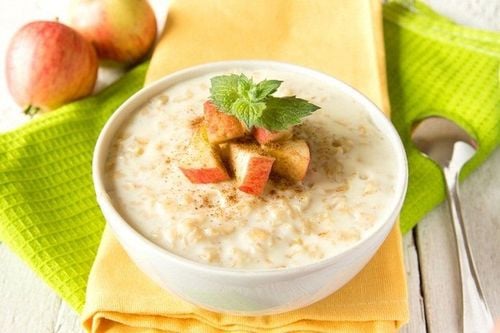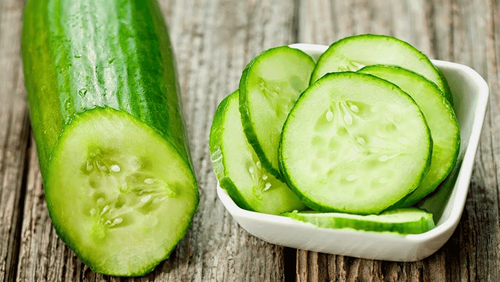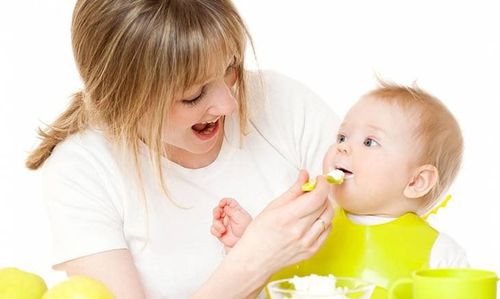This is an automatically translated article.
Baby porridge to a mother means home-cooked rice and healthy ingredients for perfect softness and deliciousness. Rice porridge or porridge is one of the first semi-solid foods that babies eat after milk. Therefore, it is necessary to cook porridge for 8-month-old children properly so that they can eat well and develop well.1. Why is porridge a good food for children?
Porridge forms a great basis for children from the moment they learn to eat solids. It is very easily digested in the stomach, providing the baby with the carbohydrates needed for energy and helping the body absorb the nutrients of the added ingredients. Therefore, porridge is a healthy food for babies and toddlers.You can cook porridge using a stovetop pot, rice cooker or slow cooker. For baby porridge, usually cook the rice together with the ingredients until everything is soft and mushy. Babies can't chew yet, so it's important that ingredients are soft and easy to swallow.
You can also cook a pot of plain rice porridge and add fresh ingredients like grated carrots, white fish, tofu, eggs, finely chopped green leafy vegetables and more. Let's start by making a simple rice porridge flavored with pork ribs.
2. The importance of porridge for children
Oatmeal is considered one of the healthy breakfast foods for children. They provide a nutritionally complete start to the day, packed with vitamins and minerals that can support a child's growth and development.Oatmeal porridges are high in complex carbohydrates and soluble fiber, which means they release energy slowly. A bowl of porridge should provide enough energy children need until lunchtime. Oatmeal porridge cooked with ingredients such as fish, shrimp, meat, bones... is a great source of ingredients that provide the following substances:
Calcium: For strong bones and teeth. Potassium: For a healthy heart. Vitamin A: Good for eyesight. Niacin: Helps with healthy digestion. Fiber: Helps prevent constipation and lowers the risk of type 2 diabetes and heart disease. Beta-glucan: Helps reduce and maintain healthy cholesterol levels. If all the goodness of this porridge isn't enough, you can add delicious, healthy and nutritious toppings.

Bạn có thể nấu cháo cho trẻ 8 tháng tuổi bằng yến mạch.
3. Some notes when cooking porridge for 8-month-old babies
When your baby is 8 months old, this is the time when your baby can eat solid foods and eat a lot of food. Therefore, parents need to pay attention and feed their children like porridge and flour. To cook delicious porridge for an 8-month-old baby full of nutrients, parents need to pay attention and pay attention to some of the following characteristics:3.1. Parents don't think about just using bone broth Nowadays, most parents or grandparents of children just stew bones and cook with porridge for children. Because everyone thinks that when stewing bones, the nutrients are extracted out of bone juice. This concept is completely wrong and has a bad trend. No matter how long the parents have stewed the bones, the nutrients are still in the meat and bones. Therefore, cooking porridge for 8-month-old weaning babies needs enough meat and vegetables, not just bone broth.
3.2. Let's give children a lot of fiber When cooking porridge for an 8-month-old baby, parents should add more vegetables, such as carrots, radishes, spinach, ... because these are good sources of dietary fiber, helping to Children digest easily and avoid constipation, indigestion. At 8 months of age, the baby's teeth are still very few and uncertain, so parents can grind and stir it into porridge to cook for children.
3.3. Adding fats from plant sources Vegetable fats are a very easy source to help children absorb and digest better than fats from animals. Therefore, when cooking porridge for 8-month-old babies, parents should use a small amount of vegetable oil, such as sesame oil, sesame oil, soybean or olive oil.
3.4. The ratio of dilution and solidity should be balanced. When the child is 8 months old, his chewing is still poor and he only has a swallowing reflex. At this stage, parents cook in a more dilute ratio than thick to make it easier for children to eat and swallow and when children get used to it, switch to a more solid diet.
3.5. Children need to eat a light diet 8 months old, parents give them 2-3 meals of porridge or powder per day. Cook porridge to eat during the day and should not be left overnight or stored in the refrigerator.
Parents who cook porridge should not add a lot of spices, because the child's kidneys are not fully developed, so eating salty food is not good for children's health.

Khi nấu cháo cho trẻ 8 tháng tuổi, mẹ nên bổ sung nhiều chất xơ
4. Some ways to cook porridge for 8-month-old babies
4.1. Pumpkin pork porridge To make this porridge for children, parents need to prepare the following food ingredients:Rice flour: 4 tablespoons. Pumpkin: Scrape off, remove seeds and mince or puree 2 small pieces. Lean pork loin: 50g. Olive oil: 1 teaspoon. A bowl of rice water. How to prepare pork porridge: Put the meat and water together and cook for 3 to 5 minutes until boiling. Then add the pumpkin and cook until the mixture is soft. When all the mixtures are soft, add the rice flour and cooking oil, stir until cooked, and pour into a bowl to cool and then feed to the child.
4.2. Carrot beef porridge To make beef porridge with carrots for children, parents need to prepare the following food ingredients:
Lean beef: 50g. Plain rice: 20g. Carrot: 20g. Bone broth or beef broth: 200ml. Olive oil: 1 teaspoon. How to prepare:
Soak rice in water for about 30-45 minutes, then wash it, pour it into the pot with 200ml of water to cook until the rice is soft. Beef is washed and dried, then cut into small pieces and minced and marinated with 1 tablespoon of olive oil. Put the pan on the stove and lightly sauté the beef. Carrots are washed, peeled, cut into small pieces and then pureed in a blender. When the porridge has simmered, put all the ingredients in the pot, stir until cooked, and pour into a bowl to cool and feed to the child.
Porridge for children is one of the first semi-solid foods when entering the weaning age. Therefore, cooking porridge for 8-month-old children properly so that they can eat well and develop are essential factors that every parent needs to understand. In addition, during this period, parents should supplement their children with supportive products containing lysine, essential micro-minerals and vitamins such as zinc, chromium, selenium, and B vitamins to help fully meet their needs. nutrition in children. At the same time, these essential vitamins also support digestion, enhance nutrient absorption, help improve anorexia, and help children eat well. Parents can simultaneously apply dietary supplements and functional foods derived from nature for easy absorption. Do not forget to regularly visit the website vimec.com to update useful baby care information.













